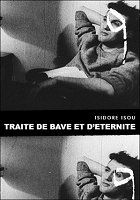Reżyseria:
Isidore IsouObsada:
Marcel Achard, Isidore Isou, Jean-Louis Barrault, Blanchette Brunoy, Jean Cocteau, Danièle Delorme, Daniel Gélin, Armand Salacrou, André Maurois (więcej)Recenzje (1)
A paradox (confessedly by the author!): Lettrism, a continuation of Dadaism and Surrealism, stood (among other things) against the semantic value of words, focusing on their material existence detached from meaning, and allowed words, letters, their shape and sounds to play the main role. However, in Venom and Eternity, the literary word, admittedly novelistic, assumes the role of meaning creator and it is an image that is destroyed to the core of its material nonsense. In this film, three levels unfold: recital (first theoretical, then novelistic), a flow of unrelated images, and finally, the subconscious tectonic plate of Lettrist music - whose essence, just like in Lettrist poetry, which Isou also lets resonate, is onomatopoeia and, to the extreme, joy from pure sound. The author clearly proclaims that the word should prevail - the image should be crushed by it. The word should no longer merely complement/correspond with the image, and vice versa. Some might complain (just like the opponents in the film, whom Isou counted on from the beginning) that the film is non-filmic, that it could actually do without the visuals. Indeed, the images usually only add a new dimension to the words, but almost never the other way around. However, the question is whether these same opponents also complain about films like Arnulf Rainer and others, that they are not films (even though they are based on the same principle as Lettrism towards words) because they do not carry meaning, which is always formed only through language... /// In any case, Isou was ahead of all others by at least a decade in 1951 and his basic film principles (disjunction of image and sound, autonomy of the material force of the image in relation to discourse, and others) are the foundation for all truly artistic modern films.
()
